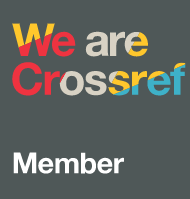IDENTIFICATION OF STUDENTS METACOGNITION LEVELS IN PROBLEM-SOLVING AND MATHEMATICAL LITERACY
Abstract
Keywords
Full Text:
PDFReferences
Alfiyah, N. (2014). Identifikasi Kesulitan Metakognisi Siswa dalam Memecahkan Masalah Matematika. MATHEdunesa, 3(2).131-138
Bell, F. H. (1978). Teaching and learning mathematics (in secondary schools). WC Brown Company.
Fauziyah, N. (2011). Identifikasi Metakognisi dalam Memecahkan Masalah Matematika Berbentuk Soal Cerita. Surabaya: UNESA
Flavell, J. H. (1979). Metacognition and cognitive monitoring: A new area of cognitive–developmental inquiry. American psychologist, 34(10), 906.
Gardner, H. E. (2000). Intelligence reframed: Multiple intelligences for the 21st century. Hachette UK.
Jablonka, E. (2003). Mathematical literacy. In Second international handbook of mathematics education (pp. 75-102). Springer, Dordrecht.
Karamarski, B. (2017). Developing a pedagogical problem solving view for mathematics teachers with two reflection programs. International Electronic Journal of Elementary Education, 2(1), 137-153.
Kazemi, F., Yektayar, M., & Abad, A. M. B. (2012). Investigation the impact of chess play on developing meta-cognitive ability and math problem-solving power of students at different levels of education. Procedia-Social and Behavioral Sciences, 32, 372-379.
Laurens, T. (2010). Penjenjangan Metakognisi Siswa yang Valid dan Reliabilitas. Jurnal Pendidikan Dan Pembelajaran (JPP), 17(2), 201-211.
Livingston, J. A. (2003). Metacognition : An Overview. New York: The State University of New York
Mahromah, L. A., & Manoy, J. T. (2013). Identifikasi Tingkat Metakognisi Siswa dalam Memecahkan Masalah Matematika Berdasarkan Perbedaan Skor Matematika. MATHEdunesa, 2(1).1-8
Marlina, L. (2013). Penerapan Langkah Polya dalam Menyelesaikan Soal Cerita Keliling dan Luas Persegi Panjang. Jurnal Elektronik Pendidikan Matematika Tadulako, 1(1), 43-52.
Matlin, M. W. (2009). Cognition. New York: John Wiley&Sons.
Maulidyawati, D., & Irham, M. (2018). Analisis Metakognisi Peserta Didik dalam Pemecahan Masalah pada Materi Turunan. Kreano, Jurnal Matematika Kreatif-Inovatif, 9(1), 84-92.
Miles, M. B., Huberman, M. A., & Saldana, J. (1994). Qualitative analysis: An expanded sourcebook. Thousand Oaks, CA: Sage.
Murtiyasa, B. (2016). Isu-Isu Kunci dan Tren Penelitian Pendidikan Matematika. Konferensi Nasional Penelitian Matematika dan Pembelajarannya (KNPMP I), 1-10
Nuraini, N., & Rejeki, S. (2017). Analisis Soal Model Pisa Dalam Buku Siswa Matematika Kelas Vii Smp/Mts Semester I Kurikulum 2013 (Doctoral dissertation, Universitas Muhammadiyah Surakarta).
Nurjanah, A. I. (2016). Analisis Level Metakognitif Siswa dalam Memecahkan Masalah pada Materi Kelarutan dan Hasil Kali Kelarutan (Bachelor's thesis, jakarta: FITK UIN Syarif Hidayatullah Jakarta).
Nurmaliah, C. (2009). Analisis keterampilan metakognisi siswa SMP Negeri di Kota Malang berdasarkan kemampuan awal, tingkat kelas, dan jenis kelamin. Jurnal Biologi Edukasi, 1(2), 18-21.
Nuurjannah, P. E. I., Hendriana, H., & Fitrianna, A. Y. (2018). Faktor Mathematical Habits of Mind dan Kemampuan Literasi Matematis Siswa SMP di Kabupaten Bandung Barat. Jurnal Mercumatika: Jurnal Penelitian Matematika dan Pendidikan Matematika, 2(2), 51-58.
OECD. (2015). PISA 2015 Results in Focus. Paris: OECD.
OECD. (2017). PISA for Development Assessment and Analytical Framework : Reading, Mathematics and Science. Paris: OECD Publishing
Ojose, B. (2011). Mathematics literacy: Are we able to put the mathematics we learn into everyday use. Journal of Mathematics Education, 4(1), 89-100.
Ojose, B. (2011). Mathematics literacy: Are we able to put the mathematics we learn into everyday use. Journal of Mathematics Education, 4(1), 89-100.
Ormrod, E. J. (2008). Psikologi Pendidikan. Membantu Siswa Tumbuh dan Berkembang jilid 1. Jakarta: Erlangga
Polya, G. (2004). How to solve it: A new aspect of mathematical method (No. 246). Princeton university press.
Purnaningsih, N. E. (2015). Profil Metakognisi Siswa Dalam Memecahkan Masalah Matematika Ditinjau Berdasarkan Tipe Kepribadian Koleris dan Phlegmatis. MATHEdunesa, 3(3). 32-38
Schoenfeld, A. H. (1992). Learning to think mathematically: Problem solving, metacognition, and sense making in mathematics. Handbook of research on mathematics teaching and learning.
Sophianingtyas, F. S. (2013). Identifikasi Level Metakognitif Siswa dalam Memecahkan Masalah Materi Perhitungan Kimia (Identification of Students'metacognitive Level in Solving Stoichiometry Problem). UNESA Journal of Chemical Education, 2(1).21-27
Styawati, R. D., & Nursyahida, F. (2017). Profil Kemampuan Literasi Matematika Siswa Berkemampuan Matematis Rendah Dalam Menyelesaikan Soal Berbentuk PISA. AKSIOMA: Jurnal Matematika dan Pendidikan Matematika, 8(2), 33-42.
Suraji, S., Maimunah, M., & Saragih, S. (2018). Analisis Kemampuan Pemahaman Konsep Matematis dan Kemampuan Pemecahan Masalah Matematis Siswa SMP pada Materi Sistem Persamaan Linear Dua Variabel (SPLDV). Suska Journal of Mathematics Education, 4(1), 9-16.
Wendt, I., & Carl, C. (1991). The statistical distribution of the mean squared weighted deviation. Chemical Geology: Isotope Geoscience Section, 86(4), 275-285.
Winarso, W. (2014). Problem solving, creativity dan decision making dalam pembelajaran matematika. Eduma: Mathematics Education Learning and Teaching, 3(1).1-16
Yarmayani, A. (2016). Analisis Kemampuan Pemecahan Masalah Matematis Siswa Kelas XI MIPA SMA Negeri 1 Kota Jambi. Jurnal Ilmiah DIKDAYA, 12-19
DOI: https://doi.org/10.33373/chypend.v5i2.1888
Refbacks
- There are currently no refbacks.
License URL: Lisensi Creative Commons Atribusi 4.0 Internasional.
Copyright (c) 2018 Universitas Riau Kepulauan

Ciptaan disebarluaskan di bawah Lisensi Creative Commons Atribusi 4.0 Internasional.















